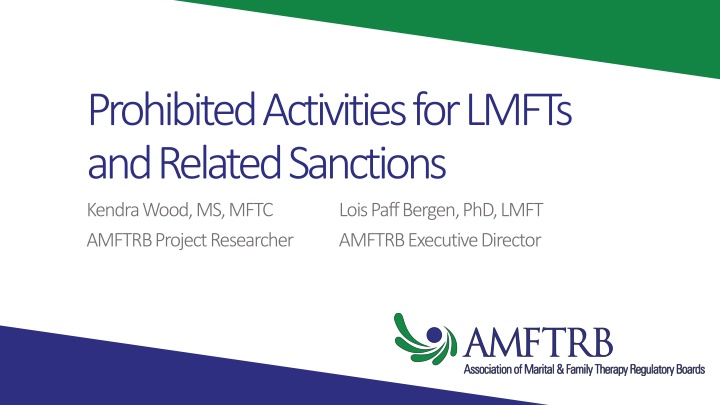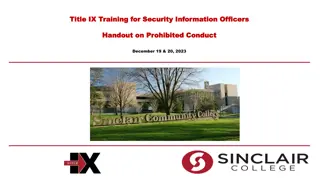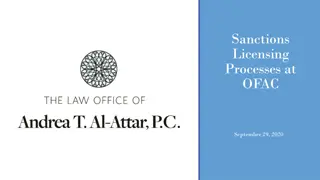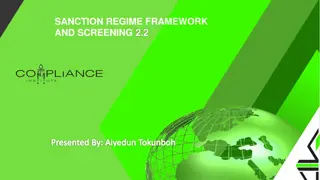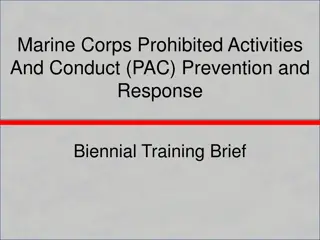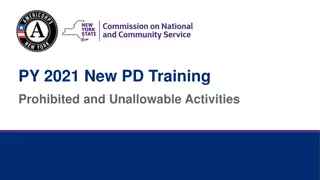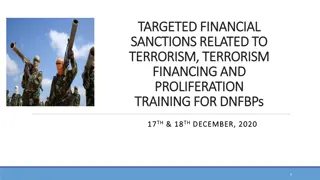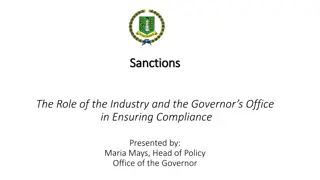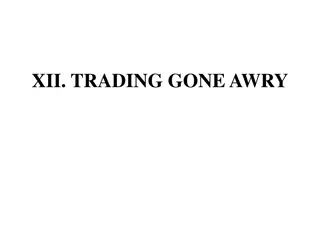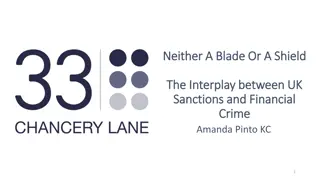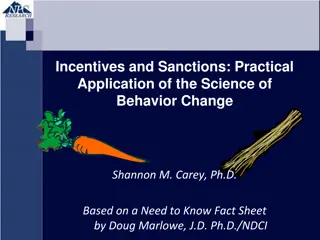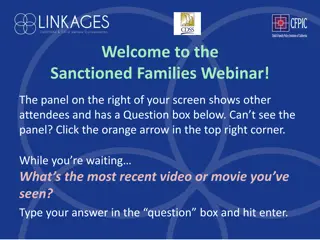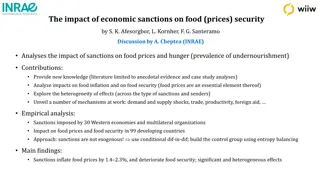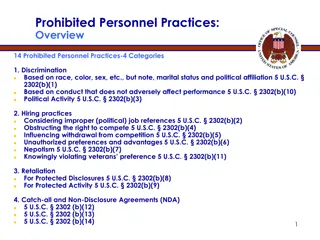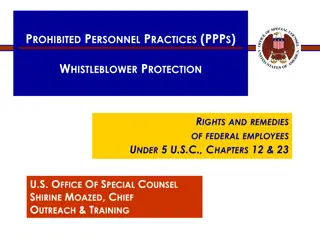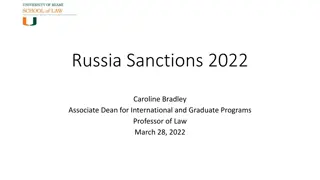Prohibited Activities for LMFTs and Related Sanctions Overview
This research delves into the prohibited activities for LMFTs, sanctions for violations, and factors influencing sanction decision-making. It covers common violations like practicing without a valid license, substance abuse issues, inappropriate relationships with clients, and misleading advertising. The study aims to provide insights into maintaining professional standards in the field of LMFT.
Download Presentation

Please find below an Image/Link to download the presentation.
The content on the website is provided AS IS for your information and personal use only. It may not be sold, licensed, or shared on other websites without obtaining consent from the author.If you encounter any issues during the download, it is possible that the publisher has removed the file from their server.
You are allowed to download the files provided on this website for personal or commercial use, subject to the condition that they are used lawfully. All files are the property of their respective owners.
The content on the website is provided AS IS for your information and personal use only. It may not be sold, licensed, or shared on other websites without obtaining consent from the author.
E N D
Presentation Transcript
Prohibited Activities for LMFTs and Related Sanctions Kendra Wood, MS, MFTC AMFTRB Project Researcher Lois PaffBergen, PhD, LMFT AMFTRB Executive Director
Description of Research (1 of 2) Review of the laws and rules for all 52 jurisdictions Prohibited activities for LMFTs Sanctions for those found guilty of those violations Mitigating and aggravating circumstances for sanction decision-making
Description of Research (2 of 2) Information listed in the Prohibited Activities for LMFTs by Jurisdiction spreadsheet and this presentation reflect laws and rules that explicitly state that the listed activities are prohibited or will incur disciplinary action if engaged in. This information is not a comprehensive list of every law/rule listed in jurisdictions laws/rules, requirements for licensure, or listed standards of practice. Researcher used discretion when combining some prohibited activities together in the spreadsheet or leaving out a prohibited activity if she felt that it was adequately represented by another listed prohibited activity. Wording in laws and rules accounts for labels, not the intended nature or meaning. Every effort was made to provide a comprehensive and accurate report. The high volume of legal material available may effect accuracy.
Prohibited Activity Categories General Advertising Insurance Research Professional Evaluations Referrals Therapist Conditions Substances Crimes Supervision Professional Competency Public Statements Relationships Therapy Practices Administrative/Board Communication
Most Common Prohibited Activities (1 of 5) Holding oneself out as a licensee or practicing when the license has expired, been suspended or revoked, on probation, or no license has been granted (51 states) Has violated or attempted to violate any promulgated laws or rules, or special directions/board orders (51) Practiced while under the influence of alcohol or drugs not prescribed by a licensed physician; habitually or excessively uses or abuses alcohol, a habit-forming drug, or a controlled substance (48) Sexual contact/intimacy with current client (48) Practiced outside the scope of their license, area of training, experience, supervised experience, specialization, or competence (46) Has used advertising that is misleading, deceptive, or false (46)
Most Common Prohibited Activities (2 of 5) Has resorted to fraud, misrepresentation, or deception in applying for/securing/renewing licensure, for continuing education, or taking any examination provided for in listed laws (46) Sexual contact/intimacy with former clients up to prescribed time period dictated by jurisdiction (44) Used a title or description denoting that the person is a marriage and family therapist when not licensed professional (43) Dual or multiple relationships with clients or supervisees (43) Has exercised undue influence on the client; exploiting a client, former client or supervisee (43) Professional/gross incompetence (42) Failed to comply with confidential agreement limitations except as provided by law and rule and third party agreement (42)
Most Common Prohibited Activities (3 of 5) Failed to comply with any of the requirements of mandatory disclosure of information to clients pursuant to listed laws (mandated reporting) (42) Failed to maintain, store and dispose of records as prescribed by laws/rules (42) Has accepted or offered referrals for the purpose of financial gain (41) Prior disciplinary action relating to a license to practice a profession by other regulatory bodies in related occupation in any other state, territory, or country (41) Abused or harassed, sexually or otherwise, a client, student, supervisee, or trainee; aiding/abetting others to do so (40) Has been convicted of or pled guilty to a felony or received a deferred sentence to a felony charge in current or previous jurisdictions; may have time limit (40) Practiced with a physical illness, physical condition or behavioral, mental health, or substance use disorder that affects the person's ability to treat clients with reasonable skill and safety or that may endanger the health or safety of persons under his or her care (39)
Most Common Prohibited Activities (4 of 5) Failed to clearly disclose and explain to clients and supervisees all financial arrangements and fees related to professional services, the use of collection agencies or legal measures for nonpayment. and the procedure for obtaining payment from the client, to the extent allowed by law, if payment is denied by the third-party payor (38) Has failed to terminate a relationship with a client and refer them when it was reasonably clear that the client was not benefitting from the relationship and is not likely to gain such benefit in the future (37) Permitted supervisee to hold themself out as competent to perform services beyond their level of education, training, or experience and that they are represented as such (35) Has failed to refer a client to an appropriate practitioner when the problem of the client is beyond the person's training, experience, or competence, when asked to do so by the client, or when absent for a extended period of time (35)
Most Common Prohibited Activities (5 of 5) Failure to report unprofessional, unethical conduct of another licensee or if they are physically or mentally unable to provide behavioral health services competently or safely or practicing without a license (34) Practicing inhumane or discriminatory treatment toward any person or group of persons (33) Sexual contact/intimacy with students, supervisees, or research subjects (33) Failed to disguise adequately the identity of a client for purposes of training or research or other non-clinical activities, or consultation (33) Terminated behavioral health services to a client without making an appropriate referral (client abandonment) (32)
Unique Prohibited Activities (1 of 3) Using information about people involved in motor vehicle accidents which has been derived from accident reports made by law enforcement officers for the solicitation of the people involved in the accidents (Florida Florida) Promoted or encouraged the illegal use of alcohol or drugs by a client (Texas Texas) *If supervises a supervisee that has more than one supervisor, failed to communicate regularly about the shared supervisee's performance (Rhode Island Rhode Island) Provided clinical supervision to persons holding a provisional license who have no intention of becoming fully licensed, or aid persons in obtaining a provisional license who have no intention of becoming fully licensed (Wyoming Wyoming) **Engaged in a personal virtual relationship with individuals with whom they have a current counseling relationship (e.g., through social and other media) (Oregon Oregon)
Unique Prohibited Activities (2 of 3) Solicited the clients of colleagues or assumed professional responsibility for clients of another agency or colleague without appropriate communication with that agency or colleague (Maine Has engaged in using or recommending rebirthing or similar therapy technique (Colorado Colorado) Promoted suicide (Delaware Delaware) Willfully planted in the mind of the patient suggestions that are not based in facts known to the practitioner (Indiana Disclosed records of a client s diagnosis, prognosis or treatment relating to substance abuse or HIV infection (Maine Knowingly participated in the child's removal or precipitated others to remove a child from the child's home without the consent of the child's parent, guardian, or custodian (Indiana Indiana) Maine) Indiana) Maine)
Unique Prohibited Activities (3 of 3) Took/attempted to take or sent intoxicating beverages, controlled substances, or firearms to any hospital providing mental health services (Florida Florida) Failed to provide and maintain reasonable sanitary facilities (South Carolina Carolina) Failure to report any unprofessional conduct that the licensee has committed (Washington Washington) *Initiated, participated in, or encouraged the filing of ethics complaints that are unwarranted or intended to harm a counselor/therapist rather than to protect clients or the public (Oregon Offered/gave/promised anything of value/benefit to a federal, state, or local government employee/official for the purpose of influencing them to circumvent a law/rule/ordinance governing the licensee's profession or occupation (Montana Montana) (South Oregon)
States that Stand Out in Some Way Delaware- Has a detailed list of 182 specific crimes that LMFTs cannot commit Guam- No information found. There is no marriage and family therapy board website or published law/rules governing MFT Oregon- Has LMFTs adhere to the American Counseling Association Code of Ethics Rhode Island- Has LMFTs adhere to the National Board of Certified Counselors Code of Ethics
Violations per Jurisdiction Violations per Jurisdiction Professional Organization Codes of Ethics Items Included Without Without Professional Organization Codes of Ethics Items Included 100 87 90 80 75 70 51525354 5455 5556596162 60 1617181920232528303134 34 3435 353637383940 404143 4344 44 4445 454647 47 50 40 30 20 9 101112 8 6 10 0 Georgia Tennessee Hawaii Alaska Louisiana Arkansas Nebraska Florida Missouri Washington Michigan Iowa Texas Arizona Guam South Dakota Virginia Illinois Minnesota Colorado Utah Kansas Mississippi Pennsylvania Maine Massachusetts Montana Wyoming Maryland Delaware Oregon New Hampshire North Carolina Alabama Wisconsin Kentucky California Vermont Rhode Island Nevada Oklahoma Connecticut West Virginina New York North Dakota South Carolina Indiana New Mexico New Jersey Ohio Idaho District of Columbia
Violations per Jurisdiction Violations per Jurisdiction With Professional Organization Codes of Ethics Items Included With Professional Organization Codes of Ethics Items Included 100 7475 757778 78798081 818485 858788909293 93 93 90 80 6970 70 5154 54555659616263 60 35 3536383940414344 4445 4547 47 50 40 283031 30 20 1112 8 10 0 Georgia Arkansas Tennessee Hawaii Louisiana Alaska Nebraska Michigan Florida Missouri Arizona Texas Iowa Colorado Maine Virginia Washington Minnesota Illinois Utah Guam Kansas Massachusetts Pennsylvania Montana Mississippi Wyoming Maryland Delaware South Dakota Vermont Oregon Alabama Wisconsin Kentucky North Carolina Nevada California Oklahoma Rhode Island Connecticut New York North Dakota West Virginina New Hampshire South Carolina Indiana New Mexico New Jersey Ohio Idaho District of Columbia
States with the Least Structured Guidelines for Prohibited Activities Hawaii (8 listed) Connecticut (11) Alaska (12)
States with the Most Structured Guidelines for Prohibited Activities Without Professional Organization Code of Ethics Items Included Ohio (87 listed) Texas (75) Oklahoma (62) With Professional Organization Code of Ethics Items Included Iowa, Oregon, Wyoming (93) New Hampshire (92) Vermont (90) Nevada (88)
Average Number of Prohibited Activities for Jurisdictions 38 violations listed without professional organization code of ethics items added 59 with professional organization code of ethics items added
Sanction Categories Informal Sanctions Limitations/Requirements Fines License Status Legal
Informal Sanctions Confidential or public letters of concern issued Reprimands Citations Warnings to licensees
Informal Sanctions Informal Sanctions Listed in Laws/Rules 35% 65% States With Informal Sanctions Listed States Without Informal Sanctions Listed
Formal Sanctions Limitations/Requirements The imposition of restrictions/limitations upon the nature of the person's practice Participation in therapy or course of training or education/examination Review or supervision of person's practice Submission to examinations to determine physical/mental condition or professional capabilities; may be at their own expense
Formal Sanctions Fines (Civil and Administrative) Ranging from $100-$50,000 Most commonly listed fine is of/not to exceed $1,000 per violation/per day/total Average of around $5000 for a fine
Formal Sanctions Fines (Others) Investigation, hearing, and/or court costs Restitution be made to an injured property owner, bills on behalf of patient or third party Reasonable attorney fees Refund of costs and fees billed to and collected from a consumer
Formal Sanctions License Status Issue cease and desist orders and/or court ordered injunctions to enjoin a licensee from practicing the profession for which the person is licensed Probationary status Deny, revoke, suspend a license LICENSE
Formal Sanctions Legal Misdemeanor Felony Imprisonment in the county jail for prescribed period of time
Most Common Sanctions Listed Deny, revoke, suspend a license (51 states) Issue cease and desist orders and/or court ordered injunctions (40) Misdemeanor (37) Issue confidential letter of concern/reprimand/citation/warning to a licensee (32) The imposition of restrictions/limitations upon the nature of the person's practice (31) Probationary status (29) Participation in therapy or course of training or education/examination (38) Civil fine of/not to exceed $1,000 per violation/per day/total (20)
Mitigating or Aggravating Circumstances Listed in Laws and/or Rules Listed circumstances No listed circumstances
Mitigating or Aggravating Circumstances 13 states have mitigating or aggravating circumstances listed in their laws/rules Arizona Arkansas California Florida Iowa Maryland Mississippi New Hampshire New Jersey Ohio Tennessee Texas Washington
Mitigating or Aggravating Circumstances Categories Factors Related to the Unprofessional Conduct Factors Related to the License Holder Factors Related to the Disciplinary Process General Factors
Factors Related to the Unprofessional Conduct Most commonly listed mitigating or aggravating circumstances Pattern of misconduct (7 states) The nature and severity of the misconduct (7) The danger and damages to the client or public (7) Whether the conduct was intentional, deliberate, or negligent (6) Dishonest or self-serving motives (5)
Factors Related to the License Holder Most commonly listed mitigating or aggravating circumstances Prior disciplinary offenses (or absence of), including warnings (10 states) The length of time the licensee has practiced (2)
Factors Related to the Disciplinary Process Most commonly listed mitigating or aggravating circumstances Whether remedial action has been taken (8 states) Conduct and cooperation of the individual during the course of the disciplinary proceedings (5) Full and voluntary admissions of misconduct to the Board (4) Submission of false evidence/statements, or other deceptive practices during the investigative or disciplinary process (3) Adverse impact of misconduct on others (or absence of) (3)
General Factors Most commonly listed mitigating or aggravating circumstances Any other factors as justice may require (4 states) The deterrent effect on the licensee or others from committing a similar crime again (4) Whether the offender has been rehabilitated or exhibits rehabilitative potential; the results of previous attempts for rehabilitation (3)
